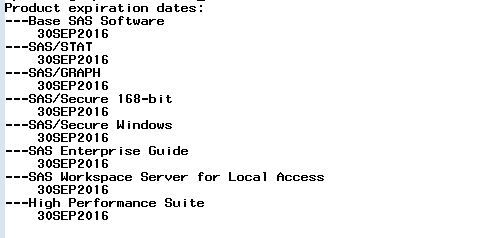- Home
- /
- Programming
- /
- Programming
- /
- Re: ods excel multiple sheets
- RSS Feed
- Mark Topic as New
- Mark Topic as Read
- Float this Topic for Current User
- Bookmark
- Subscribe
- Mute
- Printer Friendly Page
- Mark as New
- Bookmark
- Subscribe
- Mute
- RSS Feed
- Permalink
- Report Inappropriate Content
Dear experts,
I saw the following link:
and I am trying to getting familiar with the ods excel that looks interesting (despite my sas version does not allow me to use the proc export with the format .xlsx).
Where should I change this code to get the sme data also in another worksheet?
ods excel file="W:\03-OUT_outputfolder\example.xlsx"
/* will apply an appearance style */
style=pearl
options(
/* for multiple procs/sheet */
sheet_interval="none"
/* name the sheet tab */
sheet_name="Example"
);
/* add some formatted text */
ods escapechar='~';
ods text="~S={font_size=14pt font_weight=bold}~Abc def ghi";
/* tabular output */
proc print data=perm.Summary_table_xxxxxxxx;
var _all_;
title 'table';
footnote '*footnote';
run;
ods excel close;
Thanks, SH.
- Mark as New
- Bookmark
- Subscribe
- Mute
- RSS Feed
- Permalink
- Report Inappropriate Content
The creation of new worksheets is controlled by the SHEET_INTERVAL keyword in the OPTIONS() option. Your program sets sheet_interval="none", so all the program output will go on the same worksheet. Change the value of sheet_interval as necessary to put your program output to go on new sheets.
- Mark as New
- Bookmark
- Subscribe
- Mute
- RSS Feed
- Permalink
- Report Inappropriate Content
Hi Tim,
ok, I was also guessing that if sheet_interval="none" I would not get several sheets and this parameter should be edited. My question is how? For instance i changed the code as it follows:
ods excel file="W:\03-OUT_outputfolder\example.xlsx"
/* will apply an appearance style */
style=pearl
options(
/* for multiple procs/sheet
sheet_interval="none" */
sheet_interval="table"
/* name the sheet tab */
sheet_name="Example"
);
/* add some formatted text */
ods escapechar='~';
ods text="~S={font_size=14pt font_weight=bold}~Abc def ghi";
/* tabular output */
proc print data=table1;
var _all_;
title 'table';
footnote '*footnote';
run;
/* add some formatted text */
ods escapechar='~';
ods text="~S={font_size=14pt font_weight=bold}~tttttttttt";
proc print data=table2;
var _all_;
title 'table';
footnote '*footnote';
run;
ods excel close;
I get the tables on two separate sheets but:
- the second sheet is named Example2, where should I specify a different name?
- I added also the text (ods escapechar='~'; ods text="~S={font_size=14pt font_weight=bold}~tttttttttt";) but it is still on the first wook sheet, where can I set the break between the two pages?
If I am not wrong I was thinking to a similis logik like writing documents using Latex.
Thanks a gain and best regards, SH
- Mark as New
- Bookmark
- Subscribe
- Mute
- RSS Feed
- Permalink
- Report Inappropriate Content
You can review the options for ODS Excel by looking at the documentation for ODS tagsets since they're so similar.
https://support.sas.com/rnd/base/ods/odsmarkup/excelxp_demo.html
Sheet Options are here.
You're looking for sheet_label.
- Mark as New
- Bookmark
- Subscribe
- Mute
- RSS Feed
- Permalink
- Report Inappropriate Content
Thanks! since it is about exporting and formats, is there not a library with some templates that can be easily copied, re-adjusted and used (like for latex)?
- Mark as New
- Bookmark
- Subscribe
- Mute
- RSS Feed
- Permalink
- Report Inappropriate Content
Not AFAIK, it's a good idea though.
The first link has the base idea and you can find various papers on lexjansen.com.
There are a lot of options so the number of permutations are large.
- Mark as New
- Bookmark
- Subscribe
- Mute
- RSS Feed
- Permalink
- Report Inappropriate Content
ok, anyway my issue is not yet fixed and I did not find any case with sheet_interval="table".
From my perspective a bunch of exemplary templates would be for me more helpful than merely teoretical descriptions.
- Mark as New
- Bookmark
- Subscribe
- Mute
- RSS Feed
- Permalink
- Report Inappropriate Content
You don't have a SAS Access to PCFiles license?
Proc setinit; run;
- Mark as New
- Bookmark
- Subscribe
- Mute
- RSS Feed
- Permalink
- Report Inappropriate Content
Dear Reeza,
attached the result. Am I wrong?
BRs,
SH

Learn how use the CAT functions in SAS to join values from multiple variables into a single value.
Find more tutorials on the SAS Users YouTube channel.
SAS Training: Just a Click Away
Ready to level-up your skills? Choose your own adventure.



